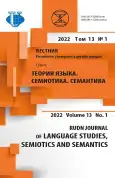The Image of Chelyabinsk in the 20th century British Media Discourse (1901-1950)
- Authors: Solopova O.A.1, Koshkarova N.N.1, Sibiriakov I.V.1
-
Affiliations:
- South Ural State University
- Issue: Vol 13, No 1 (2022)
- Pages: 9-26
- Section: DISCURSIVE STUDIES
- URL: https://journal-vniispk.ru/2313-2299/article/view/323314
- DOI: https://doi.org/10.22363/2313-2299-2022-13-1-9-26
- ID: 323314
Cite item
Full Text
Abstract
The paper studies the evolution of the image of Chelyabinsk in the 20th century British media discourse. The research proves relevant as it involves both linguistic and historical analyses; it aims at retrospective study of the evolution of the image of the foreign city in British media discourse over a large time span. A wide range of methods is employed in the study: comparative, diachronic, cognitive-matrix, cognitive-discursive methods, source study, and content analysis. The source of the data is a digitized archive of British historical media texts. The authors fixed nine variations of the city name. The frequency of modeling the image of Chelyabinsk is dissimilar: it is rather high at the beginning of the century, declines in the second decade, reaches its minimum in 1921-1930, and rises again in the subsequent decades, which is explained by the interest of the British media to industrialization and the events of World War II. Most of the newspapers and magazines that modelled the image of Chelyabinsk were published in the capitals and large industrial centres, which is explained by the peculiarities of British print media, a higher level of education of large cities residents, and Britain’s economic interests in Russia / the Soviet Union. The significant difference in the images of Chelyabinsk across the time is in their emotive load: negative images of the beginning of the century are contrasted to positive images generated in the latest time span.
Keywords
About the authors
Olga A. Solopova
South Ural State University
Author for correspondence.
Email: o-solopova@bk.ru
SPIN-code: 6992-0076
PhD (Advanced Doctorate) in Philology, Professor, Professor at the Department of Linguistics and Translation, Institute of Linguistics and International Communications 6, Lenin prospekt, Chelyabinsk, Russian Federation, 454080
Natalya N. Koshkarova
South Ural State University
Email: nkoshka@rambler.ru
SPIN-code: 3844-0536
PhD (Advanced Doctorate) in Philology, Associate Professor, Professor at the Department of International Relations, Political Science and Regional Studies, Institute of Linguistics and International Communications 6, Lenin prospekt, Chelyabinsk, Russian Federation, 454080
Igor V. Sibiriakov
South Ural State University
Email: sibirjkovig@mail.ru
SPIN-code: 3918-4851
PhD (Advanced Doctorate) in Historical Sciences, Professor, Professor at the Department of National and Foreign History, Institute of Media and Social Sciences and Humanities 6, Lenin prospekt, Chelyabinsk, Russian Federation, 454080
References
- Jepshtejn, M.N. (1987). Artistic image In Literary encyclopedic dictionary. Moscow: Sovetskaya entsiklopediya publ. (In Russ.).
- Shelestjuk, E.V (1997). To linguistic research of symbol. Voprosy Jazykoznanija, 4, 125—143. (In Russ.).
- Losev, A.F. (1995). Problem of symbol and realistic art. Moscow: Iskusstvo publ. (In Russ.).
- Avdeenko, I.A. (2014). Symbol and artistic image. Philology. Theory & Practice, 1, 15—18. (In Russ.).
- Ivanova, A.D. (2016). About the terms of modern imagology. Vestnik Vyatskogo gosudarstvennogo universiteta, 11, 74—78. (In Russ.).
- Dmitrieva, J.L. (2017). Language image vs. artistic image. Vostochnoslavyanskaya filologiya, 5, 31, 16—25. (In Russ.).
- Belousova, J.V. (2015). Image genesis and its functioning in media space. St. Petersburg: Aleteyya publ. (In Russ.).
- Vsevolodova, A.N. (2013). Media image of Russian cities in federal print mass media. Voprosy teorii i praktiki zhurnalistiki, 2, 152—158. (In Russ.).
- Gridnev, N.A. (2016). Media image of Omsk in TV news (based on “Novosti zdes” TV program of “Prodvizhenie” channel). Communication Studies, 2(8), 51—63. (In Russ.).
- Kolmogorova, A.V. & Melnikova, M.I. (2020). Metaphorical means of constructing the image of Krasnoyarsk in social media discourse. Evraziyskiy Soyuz Uchenykh, 4(73), 48—52. (In Russ.).
- Kondratyeva, O.N. (2019). The stereotypical media image of the Siberian region (based on the materials of the Russian media of the 21st century. Imagology and Comparative Studies, 12, 222—236. https://doi.org/10.17223/24099554/12/11 (In Russ.).
- Malysheva, E.G. (2014). “City of the dead”: the concentration of negative image of Omsk. Communication Studies, 2, 50—59. (In Russ.).
- Malysheva, E.G. & Gridnev, N.A. (2017). Reconstruction of Omsk media image (on the material of teksts of regional television mass-information discourse and data of resource “Medialogy”). Review of Omsk State Pedagogical University. Gumanitarnye issledovanija, 4(17), 57—61. (In Russ.).
- Huang, J., Obracht-Prondzynska, H., Kamrowska-Zaluska, D., Sun, Y., & Li, L. (2021). The image of the city on social media: a comparative study using “Big Data” and “Small Data” methods in the tri-city region in Poland. Landscape and Urban Planning, 206, 1—19. https://doi.org/10.1016/j.landurbplan.2020.103977
- Priporas, C.-V., Stylos, N. & Kamenidouo, I. (2020). City image, city brand personality and generation Z residents’ life satisfaction under economic crisis: predictors of city-related social media engagement. Journal of Business Research, 119, 453—463. https://doi.org/10.1016/j.jbusres.2019.05.019
- Ermolovich, D.I. (2005). Proper names: theory and practice of translation. Moscow: R. Valent publ. (In Russ.).
- Ermolovich, D.I. (2012). Verbal mechanics. Selected articles on language, translation and speech culture. Moscow: R. Valent publ. (In Russ.).
- Collins English Dictionary (2014). URL: https://www.collinsdictionary.com/ (accessed: 09.01.2021).
- Encyclopedia Britannica. URL: https://www.britannica.com (accessed: 08.01.2021).
- GeoNames. URL: http://www.geonames.org. (accessed: 06.01.2021).
- Oxford Lexico. URL: https://www.lexico.com. (accessed: 09.01.2021).
- The British Newspaper Archive. URL: https://www.britishnewspaperarchive.co.uk (accessed: 01.02.2021).
- The Concise Dictionary of World Place-Names (2014). Oxford: OUP. URL: https://www.oxfordreference.com. (accessed: 05.01.2021).
- The Getty Thesaurus of Geographic Names. URL: https://www.getty.edu. (accessed: 05.01.2021).
Supplementary files









